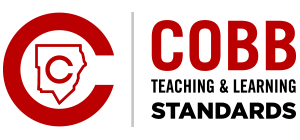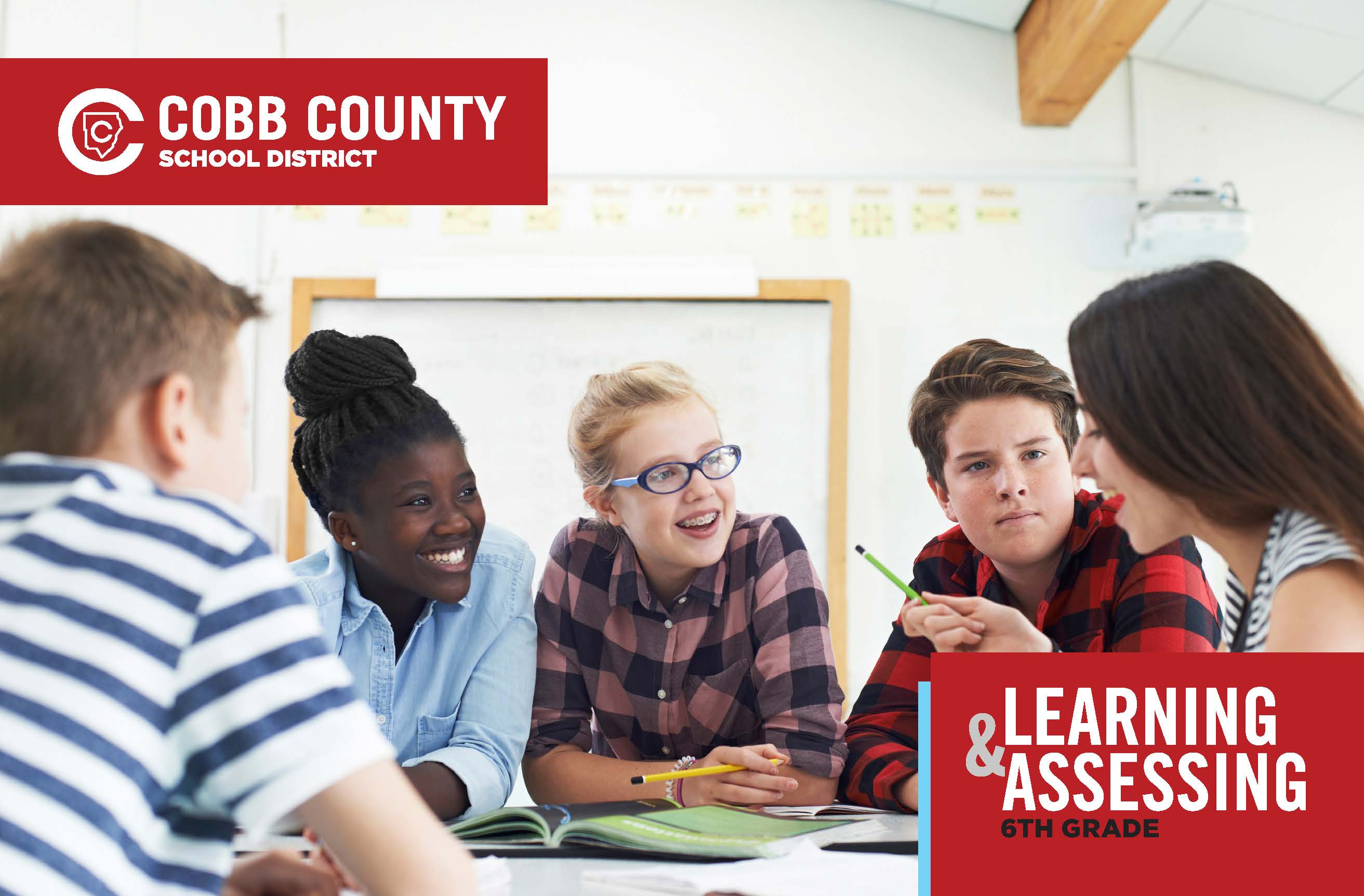6th Grade Learning

What Do Students Learn In 6th Grade?
6th GRADE LEARNING :
The Cobb County School District is committed to providing your child an academic experience that will develop his or her knowledge and skills at every grade level and to ensuring a strong foundation is established for your child to reach his or her greatest potential. Our teaching is aligned with content standards and our teachers bring those standards to life for your child through various strategies designed to meet your child’s learning strengths and needs.
In Cobb County classrooms, students are immersed every day in learning experiences based on exploration, problem-solving, and critical thinking in all content areas, including the core areas of English Language Arts, Mathematics, Social Studies, and Science; and in specialized academic content including Health, Music, Physical Education, Technology, Visual Arts, and World Languages*. Excellence in teaching guides your child’s educational experience from Kindergarten to graduation and into life.
* Programming available varies at local schools
ENGLISH LANGUAGE ARTS:
Instruction in grades 6-8 addresses students' increasing maturity and the growing sophistication of their abilities, culminating in the development by the end of grade 8 of students who are ready to succeed in high school. Students should be able to comprehend more challenging books and articles, basing all of their analyses, inferences, and claims on explicit and relevant evidence from the texts. Students will expand on their ability to identify central ideas by identifying how those themes are shaped and conveyed by particular details.
MATHEMATICS:
In Grade 6, instructional time should regularly incorporate the 8 Mathematical Practices, the Framework for Statistical Reasoning, and the Mathematical Modeling Framework through three big ideas of content: (1) numerical reasoning, (2) patterning and algebraic reasoning, and (3) geometric and spatial reasoning. The fundamental purpose of Grade 6 mathematics is to formalize and extend the mathematics that students learned in the previous grades. The Mathematical Practices, Mathematical Modeling Framework and Framework for Statistical Reasoning apply throughout each course and, together with the content standards, prescribe that students experience mathematics as a coherent, useful, and logical subject that makes use of their ability to make sense of problem situations.
SCIENCE:
In Earth Science, sixth graders dive into a more detailed and scientific study of Earth and space. They investigate rocks and minerals, exploring their connection to processes like weathering and erosion, and examine Earth's physical structure, including dynamic forces such as plate tectonics that shape our planet. Students apply this knowledge to understand the water cycle, climate, and weather, and how these factors influence the Earth. A hands-on, investigative approach strengthens their grasp of key concepts and scientific practices.
SOCIAL STUDIES:
Sixth grade is the first year of a two-year World Area Studies course. Sixth grade students study Latin America, Canada, Europe, and Australia. The goal of this two-year course is to acquaint middle school students with the world in which they live. The geography domain includes both physical and human geography. The intent of the geography domain is for students to begin to grasp the importance geography plays in their everyday lives. The government/civics domain focuses on selected types of government found in the various areas so that students begin to understand the variety of governments in the world. The economics domain builds on the K-5 economics standards; however, the focus shifts from the United States to how other countries answer the basic questions of economics. The history domain focuses on major events in each region during the twentieth and twenty-first centuries.
CONNECTIONS:
Schools offer varying Connections classes for middle school students. Connections can include, but are not limited to, Health, Physical Education, Visual Arts, Chorus, Band, Orchestra, Career Tech, and Foreign Language. The purpose of Connections is to provide broad and rich exposure to areas that nurture student interest, talent, skills, and life-long appreciation.
PARENTS TIPS: Reading
Daily reading as a family is an enjoyable and important way to grow a love or learning. Books are now available for download to electronic and digital devices and can easily be shared for family enjoyment. Students love to self-select books on topics and subjects they enjoy such as graphic novels, informational (nonfiction) texts, magazines, and online books. Talk with your child about their reading choices and encourage discussion about the book’s themes, lessons, ideas, or have them read to you.
How Do We Assess Students In 6th Grade?
Your child will have a variety of classroom assessments that will aid his or her teacher in knowing how to provide the best possible instruction for your child. Also, these assessments will help you know how well your child is learning and what extra support may be needed. In addition, your child will participate in standardized assessments that are used to gauge how well your child is doing, based upon his or her grade level expectations.
The State of Georgia requires that students in grades 6-8 participate in the annual administration of state assessments. The state assessment is called the Georgia Milestones Assessment System. Students, in grade 6 will take an End of Grade (EOG) assessment as part of the Georgia Milestones. The EOG will include multiple choice, short answer, and technology-enhanced questions. The language arts EOG has a third section, which focuses on writing.
All students in grades K-9 participate in the universal screening process for reading and math using a digital inventory. Your sixth grader’s proficiency and progress in reading and math will be measured three times a year using the reading inventory and math inventory online.
TESTING IN 6th GRADE:
Mark the Calendar: 6th grade End of Grade (EOG) Assessment: April-May
Question Types: Students respond to multiple-choice questions, called selected-response. Also, they write short answers to grade-appropriate questions. Higher-order thinking skills are employed at all levels of testing. Performance-based assessments and assignments give hands-on opportunities to express learning at different rates and levels
PARENT TIPS: Assessment
Parents can support students in easing any concern or anxiety about assessment:
- Talk with your child about any tests or assessments.
- Explain that assessment is a natural and important part of any learning. Tests help students understand their thinking better and make improvements for better performance in the future.
- Remind your child to pay attention to the directions and to listen carefully as they are read. Encourage your child to take time to understand the questions before selecting an answer.
- A good night’s rest is the best way to arrive focused on test day!
Remember that assessment is an important and helpful part of learning for students of all ages. Your support and involvement in your child’s education is critical to success in school and in life. Research shows when parents play a key role in their child’s learning, their child’s achievement excels.
What Instructional Resources Are Used In 6th Grade?
CLICK HERE TO DOWNLOAD A LIST OF BOARD APPROVED INSTRUCTIONAL RESOURCES FOR SIXTH GRADE
CLICK HERE TO DOWNLOAD A LIST OF BOARD APPROVED CTAE INSTRUCTIONAL RESOURCES FOR MIDDLE SCHOOL
Instructional resources are provided to students and teachers to support teaching and learning. The titles listed below have been recommended to our Board by a committee of teachers, parents and community representatives and approved through the textbook adoption process (See Board Rule IFAA-R). Additional resources to enhance the instruction are constantly added by local schools and individual teachers.
Course/Content Area | Resource | Publisher |
English Language Arts | SpringBoard | CollegeBoard |
Mathematics | Custom Developed Mathematics Content for Math 6 and Math 6-7 | Cobb County School District |
Science | GA Science & Technology Earth Science | HMH |
Science | Science Dimensions | HMH |
Social Studies | Clairmont World Studies | Clairmont World Studies |
What Is My Student's Framework For Learning In 6th Grade?
Sixth Grade Teaching & Learning Frameworks
English/Language Arts | Math | Science | Social Studies

Cobb Teaching & Learning Standards - English Language Arts
CLICK HERE TO DOWNLOAD 6th GRADE COBB TEACHING & LEARNING STANDARDS FOR ELA
Cobb Teaching & Learning Standards - Mathematics
CLICK HERE TO DOWNLOAD 6th GRADE COBB TEACHING & LEARNING STANDARDS FOR MATH
Cobb Teaching & Learning Standards - Social Studies
CLICK HERE TO DOWNLOAD 6th GRADE COBB TEACHING & LEARNING STANDARDS FOR SOCIAL STUDIES
Cobb Teaching & Learning Standards - Science
CLICK HERE TO DOWNLOAD 6th GRADE COBB TEACHING & LEARNING STANDARDS FOR EARTH SCIENCE

